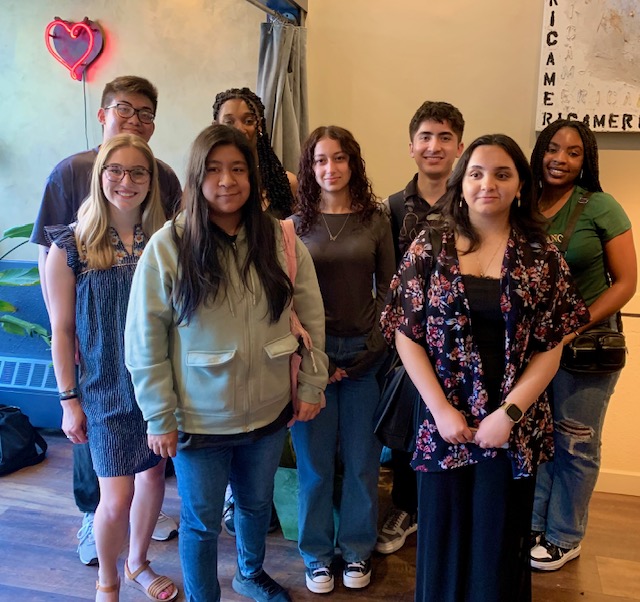(June 11 | Ann Arbor, MI) A unique partnership designed to provide access to research opportunities and professional development for undergraduate students who are part of the Kessler Scholars Collaborative network of first-generation college students gets underway this summer with Kessler Scholars from four diverse colleges and universities participating in the Rackham Graduate School’s Summer Research Opportunity Program (SROP) at the University of Michigan.
Kessler Scholars from Cornell University, Queens College, St. Francis College, and Syracuse University will be part of a cohort of 42 students from across the country who will engage in faculty-led research projects through the U-M Rackham Graduate School. This is the first year of a three-year pilot program supported by the Judy and Fred Wilpon Family Foundation to promote engagement by Kessler Scholars in mentored research opportunities, a key high-impact educational practice that can improve student success and outcomes during their undergraduate experience and beyond.
This year’s participating Kessler Scholars and their research areas are:
Danny Vu, Class of 2025, Syracuse University, will conduct research on antibiotic resistance and innovative drug therapies under the mentorship of Dr. Sriram Chandrasekaran
Laiba Mahmood, Class of 2026, Queens College, will explore the carbon and nitrogen cycling in the microbial communities in a sinkhole deep within Lake Huron with supervision from Dr. Jenan Kharbush
Maritere (Matty) Mendez, Class of 2025, St. Francis College, will explore the molecular biology of multiple myeloma alongside Dr. Qing Li
Olaa Ahmed, Class of 2026, Cornell University, will engage in research focused on flares in a combustion lab with guidance from Dr. Margaret Wooldridge
Across higher education, college students whose parents or guardians did not earn a four-year bachelor’s degree make up as much as half of undergraduate enrollment. These first-generation students are resourceful, ambitious, and highly self-motivated leaders. Yet, they often have many demands on their time as they juggle family responsibilities and job commitments, limiting their ability to pursue high-impact educational opportunities. This challenge is concerning because research by the Association of American Colleges and Universities (AAC&U) shows that engagement in high-impact educational practices such as studying abroad, supervised internships, and mentored undergraduate research provide students, particularly those from under-resourced communities, with opportunities to develop invaluable skills needed to succeed in college and better prepare for post-graduate success.
Strategic partnerships are essential to ensure equitable access for first-generation college students to engage in high-impact educational practices, including undergraduate research. A comprehensive report from Indiana University’s Center for Postsecondary Research reveals that only 21% of first-generation students participate in undergraduate research, significantly lower than the 60% participation rate of their continuing-generation peers. This stark disparity in participation underscores the need for efforts to close this gap and provide equal opportunities for all students.
The Kessler Scholars Collaborative is working to ensure that at least 90 percent of Kessler Scholars participate in a minimum of one high-impact educational practice during their undergraduate journey. To support their engagement in these transformative opportunities, we offer encouragement and resources through tailored workshops and ongoing support to demystify the process and empower Kessler Scholars to pursue these opportunities at their home institutions or beyond.
The Kessler Scholars Program is a four-year comprehensive, cohort-based support program designed to enhance the undergraduate experience for first-generation college students from lower-income communities. Students who are part of the Kessler Scholars receive holistic support that includes distinct programming, financial resources, and individualized guidance through peer mentorship and dedicated professional staff to navigate and thrive in higher education. This program model stands out for its focus on empowering and expanding access for first-generation students to participate in transformative experiences that support their academic and personal growth.
Sixteen colleges and universities operate Kessler Scholars Programs, all embedded within and supported by the Kessler Scholars Collaborative, a national initiative that allows program leaders to meet regularly to share resources and evidence-based practices, participate in coordinated external evaluation, and build opportunities for current Kessler Scholars and alumni to connect with each other across campus boundaries. Support for the Kessler Scholars Collaborative and the expansion of campus-based Kessler Scholars Programs is provided by the Judy and Fred Wilpon Family Foundation and Bloomberg Philanthropies.
SROP at U-M strives to increase the number of diverse students pursuing research-based graduate studies. Through intensive mentorship, active learning, and enrichment activities, SROP fosters a community of scholars who increase social and cultural capital and networking while mastering research skills and knowledge that advance their preparation as candidates for successful graduate study success in future careers.
Kessler Scholars participating in SROP will receive a summer stipend and live on the U-M Ann Arbor campus. This immersive ten-week undergraduate research program runs from May 25 to August 1, and upon completion, students also receive ongoing support if they choose to pursue admission to a research-based doctoral program. Kessler Scholars selected as SROP participants are connected with each other and with Kessler Scholars at the University of Michigan, the program’s founding home. Through this partnership, the Collaborative seeks to create pathways for more Kessler Scholars to engage in transformative educational experiences that contribute to student learning, graduation, and success.
—
Learn more about the Kessler Scholars Collaborative at www.kesslerscholars.org.
For media inquiries or other questions, connect with Executive Director Gail Gibson at [email protected]

